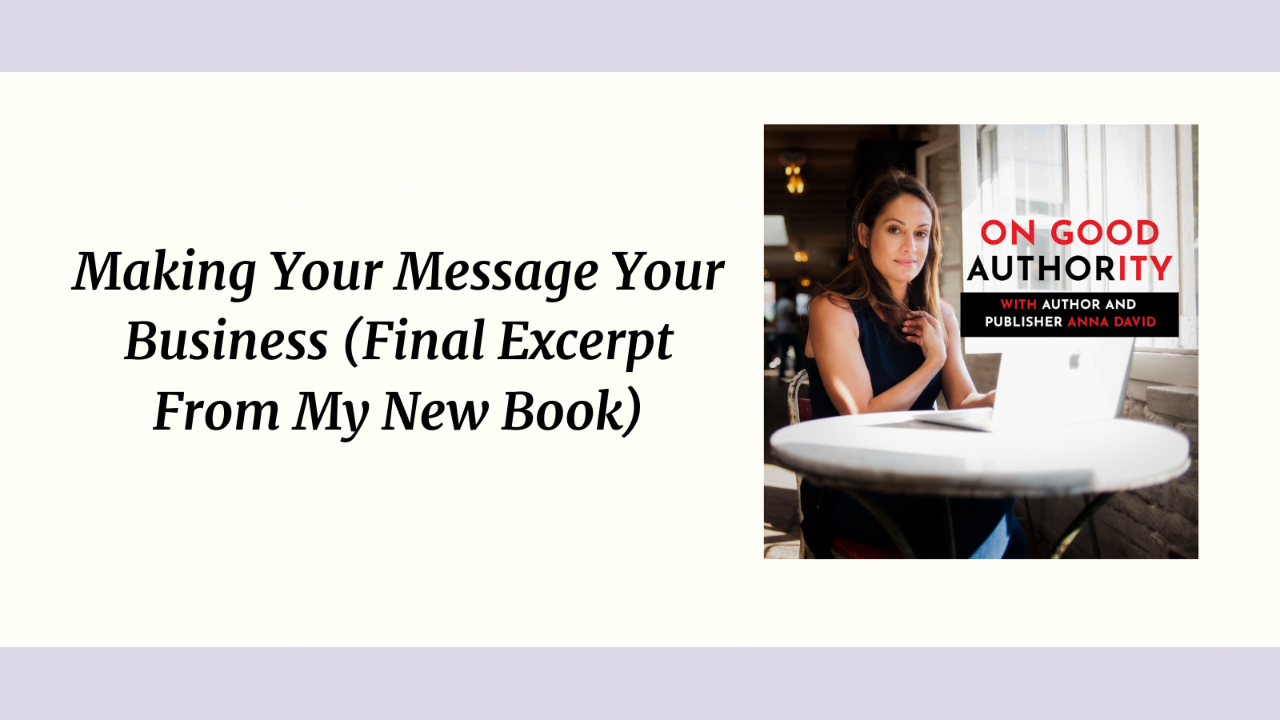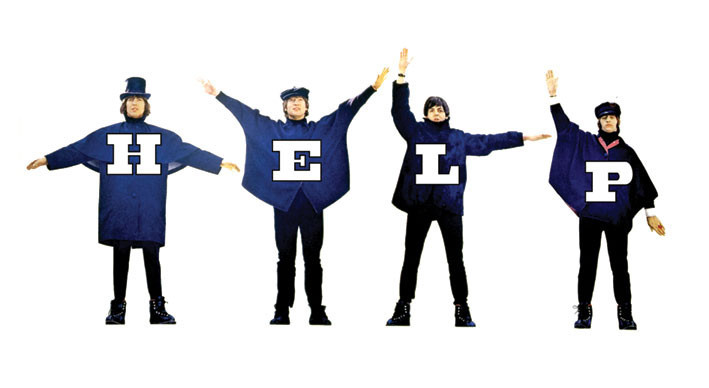
Episode 322: Anna David (That's Me!) on Making Your Message Your Business (Final Excerpt From My New Book)
Jul 29, 2020 HERE'S HOW I CAN HELP YOU WHEN YOU'RE READY:
HERE'S HOW I CAN HELP YOU WHEN YOU'RE READY:
→ You can get my 5 steps to creating a life-changing book
→ You can apply for an Authority Experience to have us create the concept and promotion plan for your authority-building book
→ You can apply for a call to work with Legacy Launch Pad (our publishing packages range from $7k-150k)
TRANSCRIPT OF THE EPISODE:
Hi there. Welcome to Launch Pad. It's a podcast all about how to successfully launch a book and what a book can do for your career. I am your host, Anna David, and every week I interview bestselling authors and the world's smartest and best marketers and entrepreneurs about how to make the most of a book.
This week, the one I'm talking to is myself. Just like the last two weeks. I am providing you with a free excerpt from my new book, Make Your Mess Your Memoir. And this is a short one. It is the last chapter. And it is about the ways you can take the memoir you made out of your mess and create something that can support you for the rest of your life. I'm talking about business. So this is the book's conclusion. You're going to hear me reading it a little bit more formally, but in the very same booth that I'm sitting in now. And if you would like the show notes, which is to say that excerpt from the book and links and all of the above, you can go to www.launchpadpub.com/blog/excerpt3. Or you can just go grab the book, go to www.makeyourmessyourmemoir.com. Grab the book. It, uh, we should give you everything you need to make your own mess into a memoir and then into a business. And now I give you the very final free excerpt from my book.
Conclusion: Making Your Message
Your Business
Okay, elevator riders, we’ve made it to the end. We’ve analyzed our messes, determined our messages and come up with a plan for sharing it with the world. There’s just one last fact I’d like to reinforce: while few of us will make a considerable amount of money from our book sales, it is wholly possible to create a successful business from a book.
Of course building a business—and finding clients for that business—isn’t easy. I know that in order to make and keep the business successful, I have to do…well, a lot.
I have to get clear about where I believe my ideal clients are and start showing up there—whether it’s a pricey marketing conference, an out-of-city workshop or a dinner party. I then have to prove to them that I, out of all the people out there offering my service, am the one to hire. And I have to accept that some of those people might still meet me, be familiar with my work and hire someone else.
I have to study other businesses as if I were in business school—subscribing to their newsletters, attending their webinars, combing through their blog posts and websites, listening to their podcasts—so that I can always be coming up with new ideas about what clients want.
I have to be indefatigable when it comes to my marketing—consistently updating my website, my offerings, my blog posts, my podcast, my newsletters and everything else. I have to be reading marketing books, experimenting with Facebook ads and embracing my business with the same enthusiasm I put toward my writing.
I have to manage people—something that can be challenging, not only because my character defects pop up but also because anyone I manage is bringing to me whatever issues they have with authority. And so I have to learn not to take it personally when they’re disgruntled—and to be open to seeing when their issues mean I have to change something about the company—or myself.
I have to consistently be observing the way we work—and always looking to refine and improve it. I have to constantly focus on trying to make our clients feel as special and taken care of as I felt un-special and disregarded when I was in the traditional publishing game.
I have to be tireless when it comes to sharing my belief that everyone who feels they have a story to share should publish a book—and that their book can help their bottom line.
I have to do all sorts of tasks I’d rather not do—from negotiating deals with clients to being the bad guy if they don’t pay on time. But perhaps the hardest part is that I have to live with the pressure of everything resting on my shoulders. The work I do, as I see it, isn’t only producing the book; it’s taking on the emotional and literal responsibility of making clients’ dreams come true. (I’m not being dramatic here; The New York Times reported in 2002 that 81% of people dream of writing a book and from my unscientific surveys, I would guess that the percentage is even higher today.)
For all the toil, the rewards of running a business are almost impossible to describe. I get to make the sort of living I never could have imagined back when I was being published by HarperCollins. More importantly, I get to facilitate a process that can change people’s lives. I’m the one who controls the elevator so if I ever feel stuck on a floor, I have all the tools I need to fix that.
But, of course, no one’s going to just hand you a business. You have to work tirelessly until it clicks. In my experience, the transition from having expertise to being able to use that expertise to run a business happens, as Hemingway put it, gradually and then suddenly.
Still, there are all sorts of “indie” business opportunities you can experiment with in the meantime. In Chapter 13, I suggested you come up with an after-book plan, whether it’s building a coaching business, becoming a consultant, launching a speaking career or anything else.
So consider where you’ve put your sweat equity; it’s probably a skill you could both put into a business and would find rewarding.
You could try to get a spokesperson deal. The best way to start is to leverage the relationships you already have. Look at the people you know through a new lens…a lens through which you can support one another in your respective goals—the way Darren Prince did when he landed the six-figure spokesperson deal. The person who hired him did so because Darren, thanks to his book, had become a valuable asset.
If you’re thinking, “Well, I’m not a sports agent and so I don’t know people who can hire me for fancy spokesperson deals,” I encourage you to make a list of the people you know; go through your address book, look at Facebook, do whatever you need to do in order to inspire your brain to look beyond the obvious. Then ask yourself: who do I know who knows other people who I may be able to work with? Keep going from there.
If public speaking is your goal, brainstorm a list of organizations that might hire you as a speaker and then, if you get hired, figure out how to make your visit into a news event the way Ryan Hampton did. Of course, it isn’t as simple as publishing a book and waiting for the speaking offers to roll in. While we have a course on the exact steps to take to launch a speaking career, the most important fact to keep in mind is that it can be a slow build.
Still, speaking is one of those careers where your fee can skyrocket once you have success. Some authors who are currently making a killing on the speaking circuit are Dorris Kearns Goodwin, who nets $40K a gig, and Tim Ferriss and Malcolm Gladwell, who are each in the $50K-plus range. I get a mere $3000-$5000 for a speaking gig, which is great since speaking isn’t a priority for me, but it’s pennies compared to these others!
If you want to develop a coaching program, take the material in your book and think about how you can develop it into material you could teach. With a program, you’ll be able to help people on a much deeper level than you did with your book while also taking a deeper dive into the topic yourself. Who knows! It might even provide you with enough material for book two!
If you want to take coaching to the next level (and possibly get paid better for it), consider offering consulting services to companies that could use whatever expertise you established with the book.
You could also create a certification program by training other people in what you’ve been teaching since the best preparation for developing a curriculum and providing certification is having a coaching program.
You could create a subscription or monthly membership program—with videos and worksheets you’ve created, guest interviews, in-person events or daily or weekly video check-ins. The main factor to remember with membership programs is that success is defined by how much direct involvement you offer.
You could put on events. We’re living in the day and age of event throwing and your event can be anything from a workshop to a retreat to a weekly gathering. It can be held at a cafe, a theater, a holistic health center or an AirBnB. (I’ve held events at all of these places.) Your agenda can cover the same material as your monthly programs. But here’s the truth: people are often just aching to connect with a like-minded community and thus the activities matter far less than the simple fact that the event is happening.
You could create a mastermind. If you look at who runs the biggest mastermind groups—people like Joe Polish, Brendon Burchard, Jeff Walker and Russell Brunson—you’ll notice that they’re all authors.
You could sell a physical product. James Swanwick, the author of The 30-Day No Alcohol Challenge: Your Simple Guide to Easily Reduce Or Quit Alcohol, watched his career skyrocket when he expanded his expertise from “quitting drinking” to “lifestyle” and started selling blue blocking glasses.
Finally, you could launch a podcast. Yes, there are a billion podcasts out there. But anyone who tells you it’s too late to start one is lying (see what I have to say on the topic here). If you’re looking for the next steps to get started, consider taking my free class on it. One factor to keep in mind: podcasts are very rarely a source of revenue; much like a book, they are a credibility builder, but they are even better at providing an opportunity for people to develop a “know, like and trust” factor with you and therefore they support all your other endeavors. And if you have ANY of the offerings above, your podcast will absolutely bring in clients.
Before you get overwhelmed by these options, remember that the first step is to write and publish your book. While my company is here to help with that, you may not need us. And so let me leave you with a thought you perhaps want to pass along to your future readers: you got this.
I’ll see you on the top floor.









